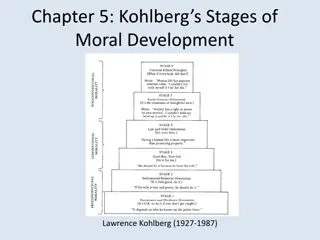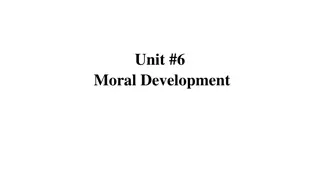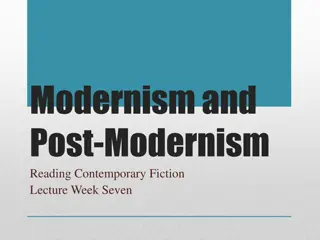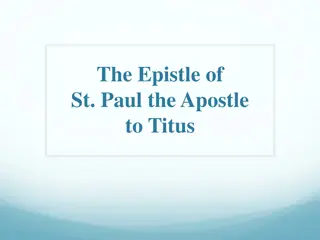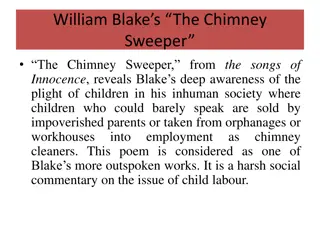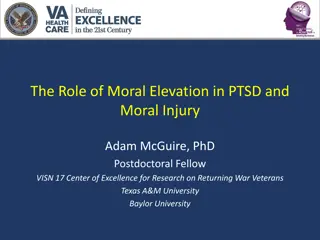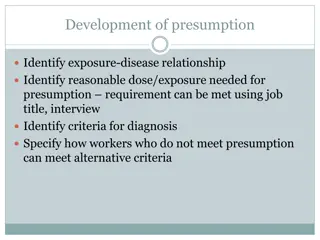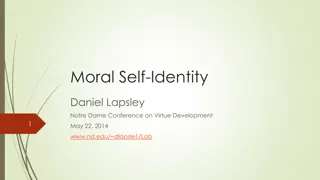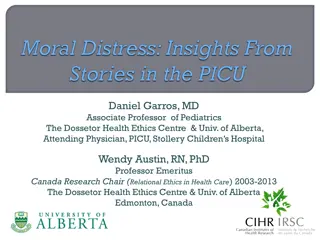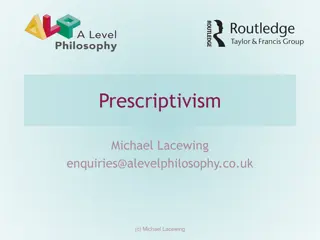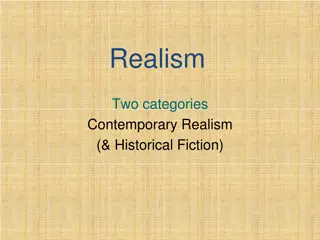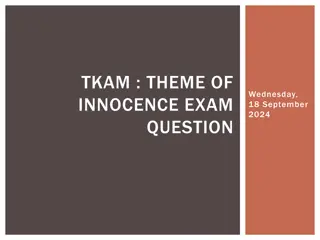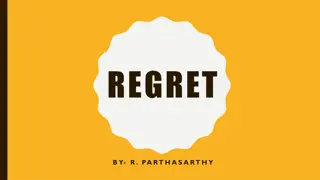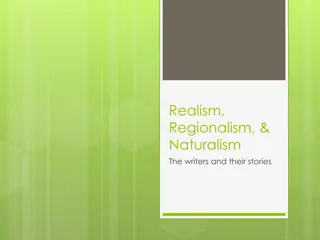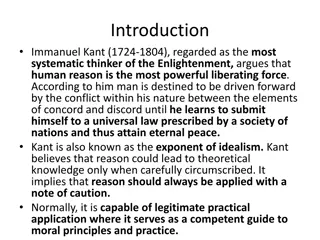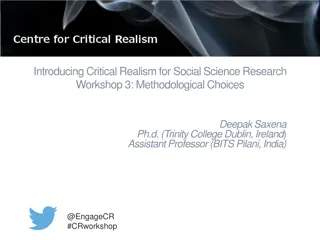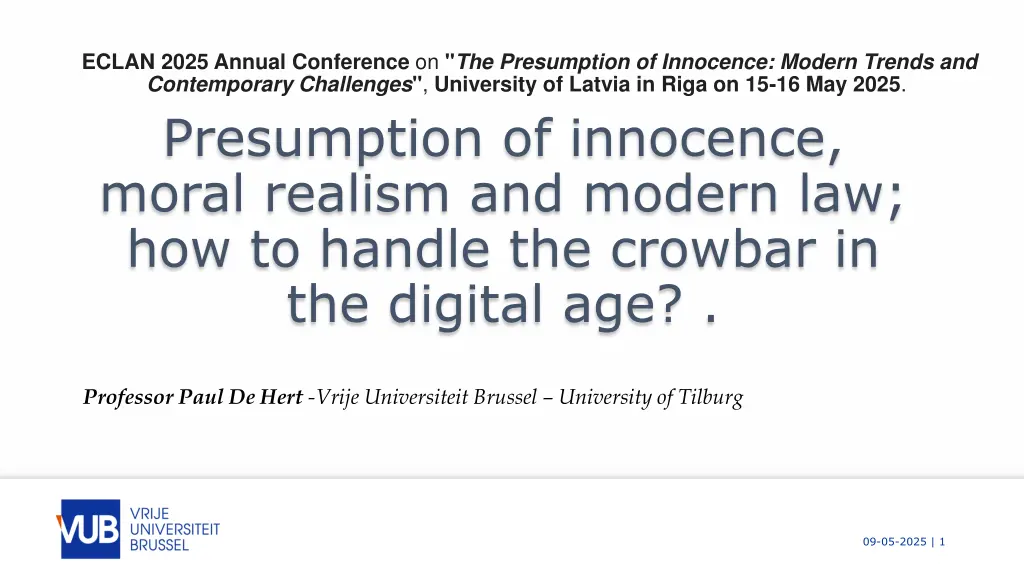
Challenges in Presumption of Innocence: Modern Trends and AI Impact
Explore the impact of AI on the rule of law, focusing on algorithmic regulation's potential threat to the presumption of innocence. Delve into the significance of the rule of law in a democratic society and the need for balance in power distribution to uphold justice effectively.
Download Presentation

Please find below an Image/Link to download the presentation.
The content on the website is provided AS IS for your information and personal use only. It may not be sold, licensed, or shared on other websites without obtaining consent from the author. If you encounter any issues during the download, it is possible that the publisher has removed the file from their server.
You are allowed to download the files provided on this website for personal or commercial use, subject to the condition that they are used lawfully. All files are the property of their respective owners.
The content on the website is provided AS IS for your information and personal use only. It may not be sold, licensed, or shared on other websites without obtaining consent from the author.
E N D
Presentation Transcript
ECLAN 2025 Annual Conference on "The Presumption of Innocence: Modern Trends and Contemporary Challenges", University of Latvia in Riga on 15-16 May 2025. Presumption of innocence, moral realism and modern law; how to handle the crowbar in the digital age? . Professor Paul De Hert -Vrije Universiteit Brussel University of Tilburg 09-05-2025 | 1
structure My interest in presumption of innocence as protection of the innocent: a practical demand for individuals to have an effective protection from the depredation of criminality and a reasonable measure of security to go about heir lawful business unmolested Short about what AI does to the rule of law Why did i not like reading Kafka MacIntyre, Western law as a theater of illusions not serving the individual Why reading Voltaire again and his contemporary nephew Markus Gabriel Some recommendations for a moral reflection about the presumption as a moral command in the digital age that works with technologies with an error rate Titel van dia 28-5-2025 | 2
What AI does to the rule of law Public authorities are increasingly turning to algorithmic regulation, or the use of algorithmic systems to apply and enforce the law. desire to improve public services and to better fulfill citizens rights, thus seemingly contributing to the rule of law. However, in practice, many use cases have demonstrated how reliance on algorithmic systems can undermine the law s protective power and instead lead to rule by law. This risk is hence neither hypothetical, nor limited to authoritarian regimes. In Europe, the creation of the European Union s AI Act offered a beacon of hope to address this concern, yet EU legislators ultimately failed to take it into account in their regulation. Nathalie Smuha therefore argues that there is a significant misalignment between the EU s digital agenda and its rule of law agenda, which urgently needs to be addressed to counter the threat of algorithmic rule by law. I want to make a small contribution focussing on criminal law provisions N. Smuha, Algorithmic Rule By Law. How Algorithmic Regulation in the Public Sector Erodes the Rule of Law, CUP, 2024 Titel van dia 28-5-2025 | 3
Interesting is her definition of rule of law The Conditionality Regulation, adopted in December 2020, allows the suspension of payments and budgetary commitments to Member States in which breaches of the rule of law 'affect or seriously risk affecting' the management of EU funds. Article 2 of the Regulation defines "rule of law" in light of Article 2 of TEU, and expands its definition by adding different layers that relate to different branches of government. For a democratic society in general, respect for the rule of law requires "a transparent, accountable, democratic, and pluralistic law-making process", in addition to "legal certainty" and "separation of powers".This aspect ensures checks-and-balances and does not allow for the concentration of power in a single entity. Particularly for the executive branch that possesses direct decision-making influence, rule of law denotes "prohibition of arbitrariness",so as to prevent partiality and corruption. For the judiciary, it requires "effective judicial protection, including access to justice, by independent and impartial courts; also as regards to fundamental rights; and non- discrimination and equality before the law".An effective and independent justice system is not only an important balance to the power of other branches of government, but it also safeguards individual freedom and rights Six elements Titel van dia 28-5-2025 | 4
How Algorithmic Regulation in the Public Sector Erodes the Rule of Law 1/ legality 2/ legal certainty 3/ prohbition of arbitray use of executive power 4/ effective legal progtection before independend and impartiooal courts 5/ equalty before the court 6/ separation of powers Remark about thoughtfullness (Waldron) and discretion 2 threats to rule of law, both via the rule by law -use law blindly (legalism) - use law deliberatively oppressive Smuha s AI doom scenario : eroding of all six leading to Algorithmic Rule of Law: 1/ primacy of techno rationality : prioritising efficiency over justice 2/supremacy of coders : desingers of the system wield public power 3/legalism (blind rule following) will be automated; no case by case correction of the law hard s edges 4/deficit of accountability : less oversight and less repsonsibility 5/systemic vulnerabiilty = vulnerable to hack but also to repressive 1 & 3 were present in the Dutch childcare benefit scandal an urgent wake-up call to ... Tte Dutch state wrongfully accused at least 35,000 Dutch parents of young children of committing fraud Titel van dia 28-5-2025 | 5
Nicols, M.A., & Sampaio, R.C. (2024). Balancing efficiency and public interest: The impact of AI automation on social benefit provision in Brazil. Internet Policy Review, 13(3) Examines the implementation of artificial intelligence (AI) systems by Brazil's National Social Security Institute (INSS) to automate the granting of social benefits. Using audit reports from government agencies, it analyses: the efficiency improvements brought about by AI, such as the speed with which benefits are granted, as well as the unintended consequences of this automation, such as the increase in the number of automatic denials and the creation of barriers for less digitally literate users, disproportionately affecting the most vulnerable population So where are we with the protection of the innocent and the presumption of innocence? Smuha s rule of law framework has a strong link with these concerns. Titel van dia 28-5-2025 | 6
Theoretical caveat with regard to PI Why has art. 6(2)ECHR given specific recognition to PI: is it an nelement of fair trial or it is more or something else? For a definition of due process (a principle that ensures the right to an equal treatment before a court), of fair trial as a broader notion, and on the interrelation between fair trial and due process , see Carsten Momsen & Marco Willumat, Due Process and Fair Trial (2024) On the potential of the PI as a principle of criminal procedure to provide a theoretical basis for digital evidence regulation, international digital forensics standards, and harmonized rules on the use of technology for investigative purposes which minimize the risks for the judicial process and specifically for suspects and defendants, Radina Stoykova, R. (2021). Rule of law? Art. 6 ECHR summarizes, non-exhaustively, the principles, individual procedural rights and additional safeguards which set a standard for procedural fairness and criminal procedure in accordance with the rule of law Stoykova 2023, 3. Titel van dia 28-5-2025 | 7
Why KAFKA (1883-1924) is hard to read for lawyers Kafka as a child and Doctor of Law (1906) best-known works include The Metamorphosis (1915) and the novels The Trial (1924) and The Castle (1926). The term Kafkaesque describes bizarre situations like those depicted in his writing Kafka, the man, was a highly competent lawyer who functioned within the legal system and championed some progressive ideals, particularly in the areas of workers compensation, insurance reform, and treatment for soldiers with mental injuries. He was consistently promoted at the state-sponsored workers compensation agency where he spent the majority of his adult life. He was neither a revolutionary nor a cause lawyer devoting his life to putting the system on trial; if anything, his personal life was rather bourgeois. But Kafka, the writer, was an extreme skeptic about progress in the law, and he was also silent about the emancipatory and progressive elements within modern law. It does not go too far to say that he was a legal nihilist. (Litowitz, 7) Titel van dia 28-5-2025 | 8
Kafka seems to argue that a person will suffer proportionally to the extent that he believes in the system. Douglas E. Litowitz, 10 Before the Law: is about a man who wishes to enter the law and believes that it should be accessible to everyone, but his entry is prohibited by a gatekeeper, and he ends up waiting for admission until his death. He is paralyzed by his belief in the system. The Trial: a man is summarily examined at his home without a warrant and without specific charges being filed, then is told to appear for an examination at an attic courthouse where no judge can be found, and ends up dependent on a useless lawyer, twisted into impossible directions by alleged court officials, and ultimately executed without ever being formally charged with a crime. He propels his case forward out of earnest righteousness, but his demand for the protection of modern law merely earns him the resentment of everyone in the system. The Castle, a purported land surveyor enters a village ruled by a Castle bureaucracy and spends his days shuffling among subservient villagers who are alienated from the Castle. Unlike these submissive villagers, he stubbornly insists on recognition by the Castle, until he becomes a vagrant and pariah in the village and never reaches the Castle. The Problem of Our Laws, the people are not even sure if there is a legal system in the first place or whether it is an elaborate fiction; Titel van dia 28-5-2025 | 9
Douglas E. Litowitz, Kafkas indictment of modern law, Lawrence : University Press of Kansas, 2017. A close study of Kafka's legal writings reveals that Kafka held a consistent position about modern legal systems, characterized by a crippling nihilism Modern legal systems, in Kafka's view, consistently fail to make good on their stated pretensions in fact often accomplish the opposite of what they promise. Chapter 5 Modern Law Has Come Unmoored from Its Normative Grounding Chapter - 6. Modern Law is Inherently Dystopian Chapter 7. Modern Law Inverts Punishment So That It Pre-dates the Crime Litowitz lists what modern law is and he begins by listing police practices that are all terrible His own view is that modern law is not as dark after all as Kafka who is himself a successful lawyer, but Litowitz admits that the American legal system today remains sometimes very Kafkaesque Titel van dia 28-5-2025 | 10
The Failures of Contemporary or Modern Law Douglas E. Litowitz, 14-16 Many will grudgingly concede that Kafka s legal fiction was a prescient depiction of a dark episode of modern law in the mid-twentieth century but 1. Mass Arrests. In Baltimore, Maryland in a single year 108,000 arrests were made in a city with a population of 640,000 persons' 2. Discretionary Stops. In cities like Chicago, the police can stop anyone at any time to fill out a contact card with the person s name and defining characteristics (physical description, tattoos, gang affiliations), even if there are no charges and no cause for stopping the person. 3. Domestic Spying. The National Security Agency, empowered by a secret court under the Foreign Intelligence Surveillance Act, presumably acting under a mandate to provide security to Americans, has been keeping secret records of Americans phone calls and their online activities 4. 'Black Sites. In many cities, people are picked up by the police for alleged violations, then taken to private black sites where they can be held without charges, beaten, threatened, and denied access to counsel. In a single Chicago location, 7,000 persons were detained over an eleven-year period, without access to lawyers, some held in isolation, shackled, and abused 5. Wiretapping. A federal appellate court held that a person could sue the government for illegal wiretapping only if the victim can prove that she was specifically wiretapped, but the list of persons who were wiretapped must remain a state secret 6. Authorities without Authority. Many governmental agencies now do the exact opposite of what they are supposed to do. The Comptroller of the Currency, a federal agency created to control abuses by banks (such as rein in excessive fees and predatory lending), promulgated new rules specifically to exempt banks from prosecution for predatory lending. Instead of protecting the customers from banks, it was protecting the banks from customers. 7. 'Lack of Access. The average person currently earns roughly $25 per hour before taxes, while the median hourly rate for a lawyer is $350 per hour, and this gulf means that most Americans cannot afford a lawyer' Titel van dia 28-5-2025 | 11
Is Europe doing better? Denmark s Ghetto Package of laws were passed in 2018 with the stated aim of eradicating ghettos , residential areas with the hallmark feature that the majority of their residents are classed as being of non-Western background. One of the Package s key provisions is a requirement to reduce common family housing (independent, not-for- profit housing) in tough ghettos (areas that have met the criteria of a ghetto for five years) to a maximum of 40% by the year 2030. 15 areas including Mj lnerparken were classed as tough ghettos when the legislation was introduced. The reduction can take place through means such as demolition and sale. This has led to thousands of people across the country losing or being in the process of losing their homes, including through evictions. Residents of ghettos are also subject to a different set of rules. Penalties for crimes can be doubled. Certain violations, for example, which are normally finable offences could mean imprisonment. https://www.aljazeera.com/features/2020/1/15/denmarks-ghetto-plan-and-the-communities-it- targets https://www.nytimes.com/2018/07/01/world/europe/denmark-immigrant-ghettos.html Titel van dia 28-5-2025 | 12
Are the innocent well protected in Europe? P. De Hert & S. Gutwirth, Police accountability between crime control and due process ( Politie-accountability tussen crime control en due process), In J. Christiaens, E. Enhus, A. Nuytiens, S. Snacken & P. Van Calster (eds.), Criminologie: tussen kritiek en realisme. Liber Amicorum Christian Eliaerts, Brussel, Vubpress, 2007, 103-12 P. De Hert & G. Pyl, The Police Act and the legality requirement: outdated? Incomplete or inaccurate? (De wet op het politieambt en de grondrechtelijke legaliteitseis. Is er sprake van veroudering, onvolledigheid of onnauwkeurigheid?), Vigiles. Tijdschrift voor politierecht, 2014, vol. 20, nr. 5, 58-74 Sachoulidou, A. (2024). The Court of Justice in Staatsanwaltschaft Berlin v. M.N. (EncroChat): From cross-border, data-driven police investigations to evidence admissibility. Maastricht Journal of European and Comparative Law, 31(4), 510-520 Titel van dia 28-5-2025 | 13
thresholds of suspicion and evidence to protect the innocent Stoykova (2021), 75 & 77 all traditional criminal jurisdictions evidence regulation is predominantly trial-centric, which strongly contradicts with the ubiquitous and multipurpose use of ( ) evidence by law enforcement before any charges are officially raised civil law jurisdictions emphasise on less evidence requirements on pre-trial and stricter rules on trial (truth-seeking judge, expert opinion rules, reasoned judgements), while the common law traditions rely mostly on trial evidence thresholds and exclusionary rules . Many authors in the Anglo-American legal tradition defend the idea that the PI requires a certain threshold of suspicion and evidence before the exercise of any powers on the individual. The claim that a certain threshold of evidence is required to rebut the PI is at first glance unsettling in the civil law systems, where the parties are not active and in non-adversary settings the prosecution does not have a burden to prove per se. ( ) Titel van dia 28-5-2025 | 14
Compare Fourth Amendment (propable cause) with ECHR European Court of Human Rights, Guide on Article 6. Right to a fair trial, COE, 2014, 203 & 204 via https://rm.coe.int/1680304c4e); Stoykova 2023, 16 Fourth Amendment: The right of the people to be secure in their persons, houses, papers, and effects, against unreasonable searches and seizures, shall not be violated, and no Warrants shall issue, but upon probable cause, supported by Oath or affirmation, and particularly describing the place to be searched, and the persons or things to be seized . Article 6 2 Everyone charged with a criminal offence shall be presumed innocent until proved guilty according to law. The ECtHR accommodates both the common law standard of proof beyond reasonable doubt and the civil law systems principle in dubio pro reo and accepts the use of presumptions A person's right in a criminal case to be presumed innocent and to require the prosecution to bear the onus of proving the allegations against him or her is not absolute, since presumptions of fact or of law operate in every criminal-law system and are not prohibited in principle by the Convention (Falk v. the Netherlands (dec.) In employing presumptions in criminal law, the Contracting States are required to strike a balance between the importance of what is at stake and the rights of the defence; in other words, the means employed have to be reasonably proportionate to the legitimate aim sought to be achieved (Janosevic v. Sweden, 101; Falk v. the Netherlands (dec.)). Titel van dia 28-5-2025 | 15
Alasdair MacIntyre, After Virtue, Notre Dame: U of Notre Dame Press, (1981), 2007. In the Enlightenment period, the traditional belief that humans are inherently relational beings was challenged. Society moved from absolutism to liberalism, prioritizing principles like equality, legalism, and scientific objectivity. vacuum. Gone is a telos that orients society. The western world became a platform with three main actors: 1) the individual, 2) the market, and 3) bureaucracy The reliance of Western continental democracies on bureaucracy has developed an individual's total reliance on bureaucratic systems to solve their problems and fears This paradigm is essential to comprehend Western European legal and administrative arrangements whenever there is a human rights problem for the individual, there comes a claim for more government. (= progressive legitimisation of State intervention in politics, economy, human rights and technology regulation). 09-05-2025 | 16
In this post enlightenment landscape, legal systems operate less as tools of justice and more as spaces of procedural performance what can also be called magic where decisions are legitimized through bureaucracy: expert reports, formal hearings, and symbolic gestures, not meaningful redress. MacIntyre insists on the role playing by managers and bureaucrats (and judges for that matter). They too are lost but claim expert knowledge Theater of Illusions (MacIntyre) Human rights frameworks offer universal guarantees and justice to individuals, encouraging them to appeal to the state or judiciary when rights are threatened. Citizens turn to governments expecting protection, but are often confronted with institutional priorities shaped by managerial logics, such as efficiency, innovation, and economic performance, that dilute substantive justice. Human rights law, though universalist in rhetoric, often functions within a state-centric, legalistic paradigm that filters out complex social and political realities. Human Rights Law fits into this post-enlightenment landscape appears as a tool for empowerment, yet often operates as a mechanism of symbolic reassurance a theater masking the limits of legalism under conditions of crisis or systemic inequality. 09-05-2025 | 17
Kieran McEvoys Magical Legalism McEvoy uses the idea of magical legalism to describe how legal systems pretend to offer justice by translating social, political, and moral problems into formal legal language, thereby filtering out the complexities of life . This creates the illusion of justice, as if naming a right is enough to solve the problem it refers to. Due to a practice of magical legalism , the dominant human rights paradigm disconnects law talk from the real world. McEvoy promotes legal humility the idea that legal actors should recognize the limits of law. Instead of pretending neutrality or supremacy, the law should acknowledge its embeddedness in broader institutional and social contexts. This demonstrates that human rights serve state-building more than individual empowerment. The legal system sustains state authority and technocratic governance under the appearance of protecting individuals. McEvoy, Kieran. "Beyond legalism: Towards a thicker understanding of transitional justice." In The Criminology of War, pp. 515-544. Routledge, 2017, 418. 09-05-2025 | 18
Anneli Albis Erosion of Classic Constitutional Rights in the EU Albi discusses the evolving relationship between national constitutional courts and the European Court of Justice (CJEU), emphasizing a shift from conflict to constructive communication. Albi argues that EU legal scholars often mistake procedural or market-based advances for progress in human rights, reflecting a deeper epistemological confusion. The CJEU creates the appearance of rights-respecting integration while sidelining substantive protections In the field of criminal law, Albi reveals how the CJEU privileges European integration over individual protections confirming the broader trend in which human rights are just one interest to be balanced, often unfavorably. Albi notes that every case the internal market wins is a step back for individual rights reminding us that law s apparent neutrality often masks its alignment with structural, not human, priorities Albi, Anneli. "An essay on how the discourse on sovereignty and the co-operativeness of national courts has diverted attention from the erosion of classic constitutional rights in the EU , In: Claes, Monica and de Visser, Maartje and van de Heyning, Catherine and Popelier, Patricia, eds. Constitutional Conversations in Europe: Actors, Topics and Procedures. Ius Commune: European and Comparative Law Series, 107 . Intersentia, . (2012): 41-70. 09-05-2025 | 19
Impact on my work P. De Hert, Proportionality in Modern Regulatory States Confused about Priorities. Judges Like, but do not Comply with Academic Doctrines , in Jan Czarnocki & Przemyslaw Palka (eds.), Proportionality in EU Digital Law: Balancing Conflicting Rights and Interests, Hart Pu, 2024, Chapter 3, 33-97 (65p) S. Gutwirth & P. De Hert, Human Rights: A Secular Religion with Legal Crowbars. From Europe with Hesitations , National Law School of India Review; Bangalore Vol. 33, Iss. 2, (2021): 420-462. Via https://repository.nls.ac.in/nlsir/vol33/iss2/9 Titel van dia 28-5-2025 | 20
Markus Gabriel, Moral Progress in Dark Times: Universal Values for the Twenty-First Century, Wieland Hoban (trans.), Polity Press, 2022, 267pp In contrast to views like MacIntyre, Markus Gabriel puts forward the bold argument that there are guiding moral principles for human behaviour. Philosopher Markus Gabriel argues that a new enlightenment based on moral facts is necessary to overcome the darkness of our times New Moral Realism, which he also calls the newenlightenment, consists of three easily stated theses: Moral realism: There are objective moral facts that are independent of opinions. Humanism: These facts are essentially knowable and the central ones are obvious when not distorted by propaganda. Universalism: These facts apply at all times and places; they are universal. 09-05-2025 | 21
Gabriel and MacIntyre Gabriel believes we ve lost our ability to orient ourselves towards an ethical conception of the human being (191) because purely economic and biological conceptions have taken over, and we ve come to assume that the only facts there are are non-moral ones. In Germany, we rely on the state as a vehicle for moral progress -an idea that emerged simultaneously lwith the German nation-state over the past two centuries and is rooted not least in the thinking of Kant and Hegel ( ) The way of the German Enlightenment entails that we assign tasks of moral education to the state, and therefore we also count moral demands on the state. In the USA, for example, the situation is different: private schools and universities generally perform this task better than state institutions, which are fundamentally distrusted because the state has a different task in the USA than here. The idea of the state as enshrined in our Constitution owes its existence to the enlightenment and assumes that there are tax-funded institutions that are measured by moral standards, that is, that serve not only to protect borders and roads to give the locgics of the market economy as much free rein as possible. Because there is a gap between universal values and their applicability in complex, specific situations, the principle of benevolence appliesThe way of the German Enlightenment entails that we assign tasks of moral education to the state, and therefore we also count moral demands on the state. In the USA, for example, the situation is different: private schools and universities generally perform this task better than state institutions, which are fundamentally distrusted because the state has a different task in the USA than here. The idea of the state as enshrined in our Constitution owes its existence to the enlightenment and assumes that there are tax-funded institutions that are measured by moral standards, that is, that serve not only to protect borders and roads to give the locgics of the market economy as much free rein as possible. (120) Because there is a gap between universal values and their applicability in complex, specific situations, the principle of benevolence applies (120-121) Titel van dia 28-5-2025 | 22
Gabriels defense of his central theses relies on a distinction between values and value concepts. Values are simply the thin categories of good, neutral, and evil: the morally necessary, permissible, and forbidden. He claims, plausibly, that these values are universal, and they are the standards against which all value concepts are measured. They require no justification beyond themselves; that is, they are not justified by evolution or the commands of a deity. They simply are the case, and we (can) know it. Value concepts are thick or concrete moral claims, such as that it is wrong to provide an abortion, or that homosexual sex is morally permissible. These are the specific moral facts about which we can be mistaken. The reason we can t always see this is that we are mistaken about non-moral facts or are victim of theories on relativism or propaganda Moral progress becoming better at recognizing what we should and shouldn t do (11), is possible by recognizing and revealing moral facts that have been partly concealed (188) and by adopting New Moral Realism. Titel van dia 28-5-2025 | 23
Moral progress: how? the project is ultimately about determining the right relationship between moral and non-moral facts and getting the moral question right and precise in the light of non-moral facts (136) Rational conversation is a laboratory of persuasion (198) Moral conversation can learn from law that: approaching a situation cautiously and calmly before making a complex moral judgment (138) Being able to put you in the position of the other / the golden rule (Kant s universalization principle): do to another what you don't want them to do to you. Gabriel notes that this rule is ancient and appears in multiple cultures (271) But only prudent moral tolerance for other notions of value Why? He does not want to create a license for value relativism The tentative moral tolerance of other notions of value and their institutional forms ends, however, when we see that under an unjust regime police officers are clearly arresting innocent people (...) No one, whether Indian if or German, will consider this morally legitimate on reflection (p121) He emphasizes a role for all domains of knowledge in this endeavor: interdisciplinary research in which philosophers and humanities must always complement hard scientists Titel van dia 28-5-2025 | 24
Gabriel and the power of Voltaire The concept of moral facts is very strong. It lifts morality higher in discussions with the facts of science and politics. They are not cultural constructs but can be measured by unviersional standards and apply to all cultures (34-35). Gabriel gives some eight examples on page 134 of what he calls moral self-evidences He speaks of a random list : Torturing children is bad, eating whole wheat bread is morally neutral, volunteering to help with the integration of traumatized refugees is good, investing money in climate protection is good, destroying the planet so that future generations have to suffer is bad, homosexuality by mutual consent is morally neutral Titel van dia 28-5-2025 | 25
Gabriel and the power of Voltaire The concept of moral facts is very strong, gut new questions may arise and always will (p92). The digital is one of these drivers that forces us to open moral reasoning. Over the course of human history, however, new forms of behavior appear all the time that we have not yet thought through morally. An important example is the rise of social networking and the use of artificial intelligence in the context of digitalization. To date, there is no well-developed ethics of artificial intelligence. This does not mean that we must now invent a set of new values, but rather that we must recognize which new forms of action fall into which moral categories (146) Gabriel s boek is relevant for today s discussion. Protecting the innocent is a moral fact ( The tentative moral tolerance of other notions of value and their institutional forms ends, however, when we see that under an unjust regime police officers are clearly arresting innocent people (...) No one, whether Indian if or German, will consider this morally legitimate on reflection (p121)) The digital is new and so is our use of quantifications, correlations, models (p180). These are fallible and so is our government, even when considering the principle of benvolence. Titel van dia 28-5-2025 | 26
Solutions Smuha, N.A. (2021). Beyond the individual: governing AI s societal harm.Internet Policy Review,10(3). https://doi.org/10.14763/2021.3.1574 (1) public oversight mechanisms to increase accountability, including mandatory impact assessments with the opportunity to provide societal feedback; (2) public monitoring mechanisms to ensure independent information gathering and dissemination about AI s societal impact; and (3) the introduction of procedural rights with a societal dimension, including a right to access to information, access to justice, and participation in public decision-making on AI, regardless of the demonstration of individual harm Titel van dia 28-5-2025 | 27
Recommendations 1. Acknowledge the Limits of Legal Magic: Do not use law s symbolic power to obscure its structural limitations. Move beyond the theatre of illusions: rights-talk and proceduralism cannot substitute for institutional justice.. This is our take on McEvoy s legal humility , one that also has an ingredient of openness towards law. 2. Engage in Substantive Rationality: Reaffirm law s role in connecting individual freedom with ultimate values. Resist the reduction of law to technical rule application. Embrace law as a space for ethical, political, and historical responsibility one that honors the autonomous individual as a bearer of value and purpose. 3. Understand Code as Law: The works of Lessig and others enlighten us to the reality that code a serves regulatory roles. Understanding that technology possesses capabilities beyond those of law and legal professionals is beneficial, as it can aid in the regulation of technology. 4. Engage in a moral reflection in a continent that does not have the Fourth Amendment and is less articulated on certain threshold of suspicion and evidence. Correlations and profiles are not facts. Using them is accepting methods with an error rate, which practically will hurt innocent 5. PI is specific application of the general principle of fairness (6 (1) and this general principles allow to develop common underlying principles of criminal procedure. The non-exhaustiveness of the specific aspects of the right to a fair trial allows the court to expand and develop new procedural guarantees in different contexts, which is consistent with the evolutionary principle of the ECHR as a living instrument which must be interpreted in the light of present-day conditions (Stoykova 2023, 3) 09-05-2025 | 28
Stoykova (2021), a good starter for the discussion of the role of criminal law in this moral reflection 1. PI mitigates the risks of false conviction on which the burden and standard of proof are based. Robert and Zuckerman consider that there is a practical demand for individuals to have an effective protection from the depredation of criminality and a reasonable measure of security to go about heir lawful business unmolested 2. Both the trial and the investigation are guided by the same procedural principles, but the investigation, given its specifics, requires a different implementation approach to achieve the same legislative goals. 3. Mere transposition of trial guarantees to the investigation stage will be unsatisfactory and potentially ineffective 4. It is not a viable argument either that the PI is particularly stringent on trial, but weak on pre-trial or that if the PI mechanisms are too strong on pre-trial, they will hamper the effectiveness of the investigation. 5. The PI doesn t change its strength throughout the criminal process, though the pre-trial has a different purpose. The PI protects the concerns for burden of proof during the trial and process integrity by requiring any errors or uncertainties to be documented and mitigated during the whole criminal process. But its main aim is is different: to protect the suspects and defendants from the negative effects of the investigation, which may in some cases increase accuracy, but may as well, set limits to the striving for evidence and conviction. 6. Requirements like the strict proportionality assessment of investigation measures, limiting the use of power based on assumptions of guilt, mitigating errors in the investigation, degree of suspicion before exercising coercive measures, are in practice additional evidence rules and thresholds based on the PI, which have little to do with the technical evidence rules based on the burden of proof during trial. Indeed, the burden and standard of proof determine the evidence threshold necessary to find a defendant guilty, but the PI determines the evidence thresholds for proving that the innocent suspects and defendants were protected from the negative risks of the investigation process. 09-05-2025 | 29
Readinglist N. Smuha, Algorithmic Rule By Law. How Algorithmic Regulation in the Public Sector Erodes the Rule of Law, CUP, 2024 R Stoykova, R. (2021). The Presumption of Innocence as a Source for Universal Rules on Digital Evidence: The guiding principle for digital forensics in producing digital evidence for criminal investigations. Computer Law Review International , 22 (3), 74-82. R Stoykova, The Right to a Fair Trial as a Conceptual Framework for Digital Evidence Rules in Criminal Investigations (2023) 49 Computer Law and Security Review 105801. C. Momsen & M Willumat (2024), Due Process and Fair Trial in Elgar Encyclopedia Of Crime And Criminal Justice 102-113 (P Caeiro, S Gless, V Mitsilegas, Miguel J Costa, J de Snaijer, & G Theodorakakou (eds.), Edward Elgar, 2024 P. De Hert & R. Bellanova, Mobility should be fun. A consumer (law) perspective on border check technology , TheScientificWorldJOURNAL, 2011, vol. 11, 490-502 P. De Hert & S. Gutwirth, Police accountability between crime control and due process ( Politie-accountability tussen crime control en due process), In J. Christiaens, E. Enhus, A. Nuytiens, S. Snacken & P. Van Calster (eds.), Criminologie: tussen kritiek en realisme. Liber Amicorum Christian Eliaerts, Brussel, Vubpress, 2007, 103-12 P. De Hert & G. Pyl, The Police Act and the legality requirement: outdated? Incomplete or inaccurate? (De wet op het politieambt en de grondrechtelijke legaliteitseis. Is er sprake van veroudering, onvolledigheid of onnauwkeurigheid?), Vigiles. Tijdschrift voor politierecht, 2014, vol. 20, nr. 5, 58-74 Titel van dia 28-5-2025 | 30


